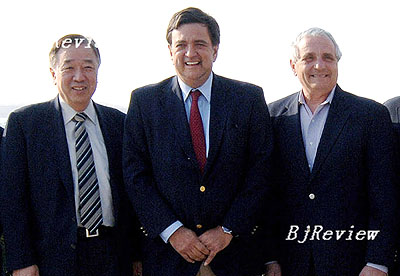
In the Joint Document issued on February 13 by North Korea, South Korea, the United States, Japan, China and Russia after their fifth round of talks, North Korea agreed to shut down and seal the Yongbyon nuclear facility in 60 days as an initial action to implement the 2005 Joint Statement aimed at achieving denuclearization of the Korean Peninsula. However, it failed to do so as of April 14.
The reason why North Korea refused to carry out the Joint Document is that it had not gotten back its $25 million deposited in the Banco Delta Asia (BDA) in Macao, which had been frozen by the U.S. Treasury Department. North Korea takes the lifting of U.S. financial sanctions as the precondition for shutting down the Yongbyon nuclear facility. In fact, the United States announced in March that it would unfreeze the funds. However, the U.S. Treasury Department issued a final rule against the BDA, which it labeled as "a primary money laundering concern," leaving the matter in the hands of the Government of the Macao Special Administrative Region. As a result, the funds were still virtually frozen.
It was not until April 10 that the U.S. Treasury Department announced in a statement that the United States would support Macao's decision to unfreeze the funds based on the discussions with North Korean and Chinese officials, including those from Macao, and the understanding reached on the use of the funds.
"The United States understands that the Macao authorities are prepared to unblock all North Korean-related accounts currently frozen in the BDA," the statement said. It was reported that Chun Yung Woo, South Korea's chief negotiator to the six-party talks, said on April 10 that North Korea would be able to withdraw its money freely from the next day. According to the Yonhap News Agency, the final solution proposed by the United States was that it would give North Korea free access to its funds in the BDA no matter whether the accounts are legal nor not. The proposal scrapped restrictions on the use of the funds, but required North Korea to transfer the funds by itself.
The Monetary Authority of Macao gave a positive response to the U.S. statement, saying that it would coordinate the efforts of relevant departments in the special administrative region to properly deal with the issue in a lawful manner. It indicated that the $25 million could be withdrawn or remitted by the holders of the 52 accounts or with their authorization. This meant the BDA would unblock the North Korea-related funds and put them at the clients' disposal. It seemed that steps were duly taken to unfreeze the funds.
Pyongyang wanted confirmation, though. Regarding the U.S. plan, the North Korean Foreign Ministry said North Korea would check if its funds in the BDA were unfrozen before it took action, while reaffirming its commitment to the February 13 Joint Document. At this stage, everything seemed to be going well.
However, it appeared that North Korea would act not at the mere promise of the United States but only when it has actually received the funds, a position that complicated the matter. Sources from Macao have shown that the funds are in 52 different accounts, some of the depositors are dead, and some of the accounts are anonymous. These problems have posed technical barriers to resolving the funds issue.
| 